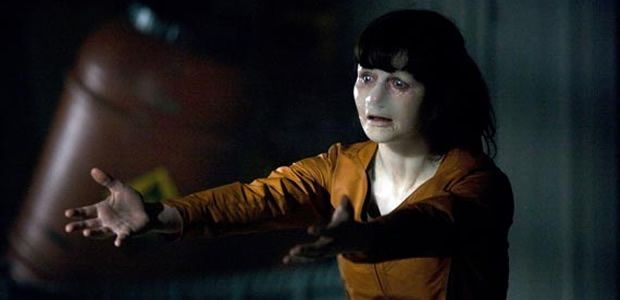We always knew that clones would end up being trouble in the end, but last night's episode of Doctor Who nonetheless raised all manner of new questions to ask about "The Rebel Flesh." Here are five of them.
Wasn't Moon A Great Movie?
As atmospheric as it was, "The Rebel Flesh" felt very, very familiar. "Copies" of people working menial jobs in science fiction settings that are convinced they are the originals? Yeah, I really liked Duncan Jones' Moon, as well - but even within the last few years of Who, there were echoes of "The Waters of Mars" and "The Impossible Planet"/"The Satan Pit" from the David Tennant era. You'd think that, by this point, the Doctor wouldn't be able to meet teams of low-grade workers without expecting life-threatening disaster to strike within twenty minutes or so.
What Is The Future Of The Flesh?
The Doctor clearly knows more about the Flesh than he's saying - but what? Presumably, considering his reaction to them, at some point in the future they'll be officially recognized as their own, distinct, lifeform... but is that in reaction to what happens in this particular event, and in which case, does the Doctor actually know exactly what's going to happen to everyone else on the base (Actually, that'd make it way too like "The Waters of Mars," come to think of it, so probably not)? My potentially off-base prediction: The Flesh go on, somehow, to evolve into some alien race that we already know about. Maybe the Autons, from (amongst other episodes), "Rose," the story that started out the whole revival of the show? Mind you...
Why Doesn't Anyone Point Out That Rory Knows Exactly What It's Like For The Flesh (Including Rory)?
A ridiculously important part of the finale last year was that Rory died, and was then recreated as a Nestene Duplicate... which, surely, makes him know what it's like for the Flesh, considering he was (at least temporarily) also "just" an artificial duplicate of a human being, with downloaded memories, feelings and "soul"? I can't work out if the fact that no-one has mentioned this is because (a) all of that was wiped from everyone's memories as a result of the Big Bang II at the end of "The Big Bang," (b) it's being saved up for next episode, or (c) the writer just plain forgot that happened. I'm hoping it's option b, because it makes Rory's sudden bravery a lot more understandable.
What's With The Sneezing?
Seriously, am I the only person that thinks that the one worker who keeps sneezing is going to end up being important for some reason? Like, he'll end up being revealed as a Ganger who's permanently replaced his original human without knowing it, and he's slowly falling apart, or something similar? If it ends up to be just that he has a cold, I can't tell if I'll be depressed or happy that I didn't know where the story was going...
Is a Ganger Time Lord Still A Time Lord?
So, the Doctor has been Fleshed, and according to the trailer for the next episode - Two weeks away, BBC America? Really? - he'll end up fighting the original Doctor for survival. But I can't help but wonder if there's some importance to seeing a "second" Doctor like this. Almost every episode so far this season, there's been more than one Time Lord or something very, very similar, have you noticed? Two Doctors in "The Impossible Astronaut," the potential daughter of Amy/Small girl who's regenerating at the end of "Day of The Moon," and then the Tardis' human form last week. Only "The Curse of The Black Spot" stands out by having just one Doctor. Is this a weird coincidence, or a tease of something in store for future episodes? I have to admit, the more episodes we see this year, the more I'm expecting a full-on Time Lord revival by the end of this season.
...Not that that'll explain how the Doctor apparently died at the start of it, mind you. And what does any of this have to do with the Silence/Silents? Only two more episodes until the mid-season break and, I hope, some answers.

